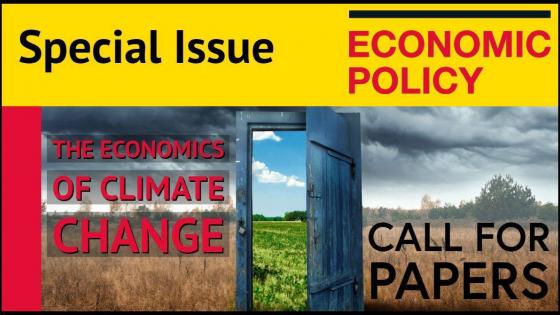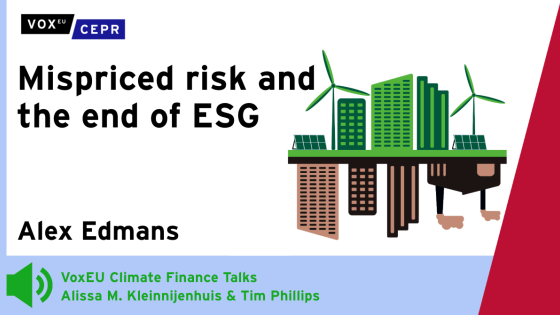The Intergovernmental Panel on Climate Change estimates that global average temperatures will exceed pre-industrial levels by +1.5°C between 2030 and 2052 – and that they will rise further depending on volumes of human greenhouse gas emissions (IPCC 2019). Drought intensity and extreme weather frequency, sea level rise and ecological damage are expected to increase in the process. This is expected to lead to significant, mostly negative, and in some cases disastrous effects on human welfare around the globe.
The complex and dynamic long-term effects of greenhouse gas emissions thus pose a substantial collective action problem to the international community. How can this problem be best addressed? In our view, economic analysis is vital here: for policies to be effective, a detailed understanding of how our societies work – in particular how markets work, as markets are a cornerstone of almost all economies around the world – is fundamental. That is, even if we reached a consensus to limit greenhouse gas emissions by some specific amounts in each year and for each country, how could these emission reductions actually be achieved? This is not a question that natural scientists are equipped to answer; it is a question for us.
Have economists let the world down?
Has economics failed to take climate change seriously? Are the profession’s best minds focused on the issue? In a recent Vox column, Oswald and Stern (2019) showed how surprisingly few articles on climate change have been published so far. The profession, they argue, has (so far) let the world down on making essential analytical contributions to the question. One possibility is that they are right and that economics could do much more to generate and put forward novel ideas to manage the transition to an environmentally sustainable economic model. It is, on the other hand, also possible that we have already good answers but perhaps have failed to communicate them well. A Special Issue of Economic Policy, and the conference covering it, will discuss these important, open questions.
Europe’s Green Deal
A particular discussion point may be the December 2019 announcement by the European Commission of a European Green Deal, an ambitious reform and investment programme. The Green Deal intends to provide a ‘new paradigm’ for Europe’s economy:
A new growth strategy that aims to transform the EU into a fair and prosperous society, with a modern, resource-efficient and competitive economy where there are no net emissions of greenhouse gases in 2050 and where economic growth is decoupled from resource use. (European Commission 2019).
Underlining this commitment, the Commission announced that all “EU actions and policies will have to contribute to the European Green Deal objectives" and aims to introduce a Climate Law in early 2020 to enshrine carbon neutrality by 2050 in legal frameworks. At the heart of the programme lies an extensive plan of prospective policy actions, including but not limited to emission trading, land use and forestry regulation, agriculture, (renewable) energy policy and energy taxation, mobility, railways and industrial policy towards a clean and circular economy covering construction, plastics, steel, batteries, waste and other sectors. The Commission's plans are likely to feature prominently at this year’s World Economic Forum, celebrating its 50th anniversary.
Call to impact: The Special Issue
Economic Policy is the only pan-European high-impact policy journal, and the ideal platform for this transformational debate. As its Managing Editors, we think that our profession has important insights to share with society and an important role to play in addressing how to design policy to properly deal with the climate-change challenge. We are calling for contributions to a Special Issue on "The Economics of Climate Change". Successful articles will address the fundamental challenges and aim at high impact in the policy debate. The editors are looking for theoretical and empirical contributions that combine rigorous research with distinct policy messages. Topic-wise, the special issue aspires to reflect the full breadth of the intersection of climate and the economy including
- The economics of reducing CO2 emissions and the paths to a carbon-neutral economy
- The political economy of an international agreement on carbon pricing
- The international and regional, distributional and sectoral impact of carbon pricing and emission reduction policies
- Robust polices for the uncertain consequences of greenhouse gas emissions
- The role of complementary public infrastructure investment to manage the transition, and its financing
- The role of central banks and green finance projects in supporting emission reductions, and
- The implications for trade and trade policy, migration, and globalisation.
The Special Issue will be edited by two outstanding guest editors: Per Krusell and John Hassler. Both have worked on issues revolving around climate change for over a decade and have made important contributions to the debate (Golosov et al. 2014, Hassler and Krusell, 2012, Hassler et al. 2016). Successful papers will be invited for presentation at a high-profile policy event in Frankfurt in October 2020. The deadline for submission of papers via our online submission system (https://mc.manuscriptcentral.com/ecpol) is 15 March 2020.
References
Arrow, K, B Bolin, R Costanza, P Dasgupta, C Folke, C S Holling, B-O Jansson, S Levin, K-G Mäler, C Perrings and D Pimentel (1995), “Economic growth, carrying capacity, and the environment”, Science 268(5210): 520–521.
Arrow, K, M Cropper, C Gollier, B Groom, G Heal, R Newell, W Nordhaus, R Pindyck, W Pizer, P Portney, T Sterner, R S J Tol and W Weitzman (2013), “Determining benefits and costs for future generations”, Science 341(6144): 349–350.
European Commission (2019), “Communication from the Commission to the European Parliament, the European Council, the Council, the European Economic and Social Committee and the Committee of the Regions: The European Green Deal”, European Commission, Com(2019) 640.
Golosov, M, J Hassler, P Krusell and A Tsyvinski (2014), “Optimal taxes on fossil fuel in general equilibrium”, Econometrica 82(1): 41–88
Hassler, J and P Krusell (2012), “Economics and Climate Change: Integrated Assessment in a Multi-Region World”, Journal of the European Economic Association 10(5): 974–1000.
Hassler, J, P Krusell and J Nycander (2016), “Climate Policy”, Economic Policy 503-58.
IPCC (2019), Global Warming of 1.5°C, Intergovernmental Panel on Climate Change, Special Report.
Oswald, A and N Stern (2019), “Why does the economics of climate change matter so much, and why has the engagement of economists been so weak?”, Royal Economic Society Newsletter, October.
Weitzmann, M L (2009), “On Modeling and Interpreting the Economics of Catastrophic Climate Change”, Journal of Economics and Statistics 16(1): 1–19.










